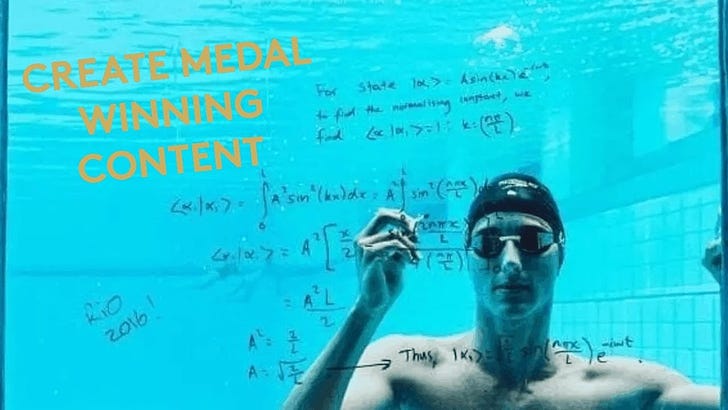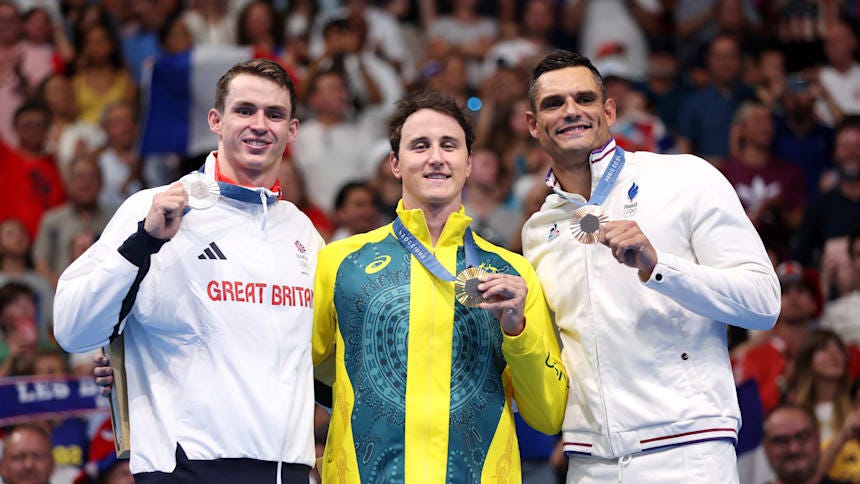Welcome to the new joiners. I’m George, from Orama a content studio that helps Β2Β brands grow with podcasts. To kickstart September, and inspired by the Olympics, I’m doing a series of short audio/video/text posts to share some research and insights around creating brand content that generates results.
Read below, listen to the audio on the link above, or watch the video👇🏼
Like everybody else, I've been watching the Paris Olympics. As I like swimming, I didn't miss the 50m sprint (the equivalent of the iconic 100m sprint in track & field). The atmosphere was particularly joyous, and I was pleased that all “my” countries got a medal (🥇🇦🇺 🥈🇬🇧 🥉🇫🇷 - My kids are Australian, British, French).
It was a great race, finished in 21 seconds, but it will have a long-lasting effect on the sport, because a relative outsider, Australia's Cameron McEvoy, won with a very unusual approach. And it made coaches and athletes rethink their training.
Even journalists were puzzled and kept asking McEvoy (you can hear/see the questions in the audio/video version):
How did you come up with the idea of winning an Olympic gold medal in swimming by swimming not very much? (laughs)
This struck me because that's what this podcast is about. How B2B/complex industries, such as enterprise fintech, can create content which generates revenues (= gold), or other measurable results (medals!). And how by escaping the norm, you can achieve better results.
Training long distances in swimming will make you fit, but McEvoy showed there are better ways to train for gold.
Content for B2B has many benefits, but if revenues are your gold medal, there are better ways than the traditional approach to content.
Culture matters in sport and business
I'm a mediocre, veteran swimmer, but I know enough to witness something that every swimmer can confirm: it's very much about the volume of training, many sessions in the pool with extensive mileage.
Swimmers train harder than most other sports. My neighbour is a Premier League football coach and told me how a new manager shocked the team when he asked for more than an hour of training per day. The typical elite swimmer would have two gruelling swimming sessions, six times a week and cover huge distances, 10 kilometres a day is not unusual (multiply by four or five to estimate the running equivalent.). And you have to add gym sessions.
NB: I don’t mention the financial difference between pro footballers and elite swimmers who depend on state subsidies.
The “distance culture” also prevails for sprinters, despite some differences.
That's also what external commentators assume, like this lady you can hear/see in the audio/video:
And when it’s part of your culture, you don’t ask questions about it.
The parallel with B2B brands is that they have embraced the idea of creating content, so much that they don’t ask the ultimate question: how does it link to revenues, or move the needles in other ways?
McEvoy went on a journey of exploration and drew from other disciplines to design a different training program with his coach. But ultimately the mileage question comes naturally to a casual observer with a “beginner’s mind” in the swimming world.
I need to insist that swimming, is not a new sport, it has been data-driven and scientific for years, but still, people woke up to something new.
When it comes to B2B content, there’s also an unwritten playbook. We need to attract eyeballs, to show some thought leadership. Some activities can feel compulsory: whitepapers, webinars, events, and articles. They are all good. But if you have limited resources, they can be exhausting and there may be better ways to achieve what matters, create relationships and convince potential buyers.
Punching above your weight
Here’s a picture of the podium, as they stand together on the same march. You may notice that McEvoy is a bit shorter than the other two.
Sprint swimming used to be dominated by larger athletes, the difference with McEvoy and the other guys is even more striking with their shirts off. If you were to design a 50m swimmer, you’d probably pick the giant Manaudou as a model.
McEvoy is punching above his weight. And that’s the opportunity for startups and challenger brands. Content allows you to punch above your weight.
The parallel with B2B brands is that the content is not about looking big or being popular. It should be about delivering the right type of results. My business, audience, and clients all try to punch above their weight.
Data-driven vs. end-result driven
Another important aspect of this race and the personality of the Australian swimmers that the media love is he's called ‘the Professor’. He graduated with a science degree, majoring in physics and mathematics. So yes, he’s data-driven and that’s how his unique training regime was built.
I think being data-driven is something that the majority of people on this list already appreciate. For content, you want to measure, iterate, and improve based on whatever data you have.
Yet a challenge with this approach for brands is that it makes it easy to lose sight of the end result.
If you launch a new content initiative, and you want to show it works, you will measure the reach, and how many people click. Maybe how many people like and interact with your content. It's still data-driven and important. But you never want to lose sight of the end result.
It doesn’t have to be sales. It can be softer data such as:
Contribute to Account-Based marketing (ABM) efforts
Improve the relationship with one decision-maker or influencer in the process
Networking benefits (someone who can introduce you to someone)
Inspire people internally
Insights that improve our product
What I often observe with fintech startups, that launch successfully, raise funding rounds which allows them to have a marketing budget and then try to tick the boxes of the financial marketing playbook, which include some or all of those: webinars, events, whitepapers, articles, podcast, social media, etc.
Swimming long distances will make you fitter.
And ticking all the boxes will all have benefits.
But you may not get you a medal, and you may exhaust yourself in the process. This brings me back to the conversation about BOFU content.
The focus is typically on brand building or brand awareness, which is fine, which is important, but content can do a lot more than that. Content can also generate leads, can also bring in customers.
So it's important to keep a distance from the conventional marketing playbook and measures for “data-driven content” and stay closer to the end result.
See you next week.
PS: yes next week, which is unusual as it’s normally monthly and I’m busy, but…
Maybe I feel bad for criticizing traditional swim training and the culture of mileage. I am doing something that’s very much inspired by old-school swim coaching. After a break, comes “hell week”, an extra intensive week where you swim even more than usual. It has a physical impact, but also a mental one. It’s hard but the rest of the year will be easier. So I'm doing my own little sprint as I return after the Summer break. It’s to regain my ‘podcast memory muscle’, and to share some recent research and conversations that I can’t wait to share.
The next episode will be about the challenges of launching a podcast, and the idea of a “Minimum Viable Podcast”, or MVP inspired by the “Lean Startup” book.
(Hint: The MVP doesn’t need to be called a Podcast.)












Share this post